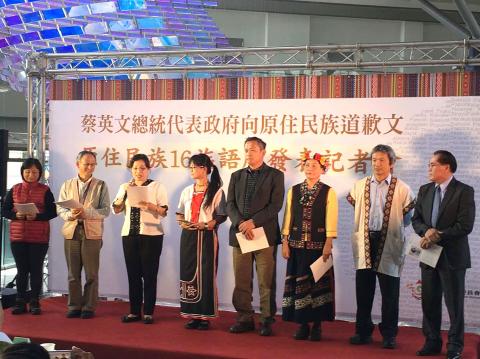Following President Tsai Ing-wen’s (蔡英文) closely watched apology to Aborigines in August, the Council of Indigenous Peoples announced plans to publish a full text of the apology in 18 languages, including 16 officially recognized Aboriginal languages, as well as English and Japanese.
Council Minister Icyang Parod told a news conference in New Taipei City on Wednesday that Tsai’s apology, made on behalf of the government for the discrimination and neglect of Aborigines over the past 400 years, was not only the first step toward reconciliation and peace, but also the first time any head of state in the Asian region has offered an apology to Aborigines, adding that it was historically significant for Indigenous peoples.
The apology, made on Aug. 1, Indigenous People’s Day, was given in Mandarin after a ceremony in front of the Presidential Office Building in Taipei, if front of representatives of Taiwan’s 16 recognized Aboriginal communities.

Photo: Wu Po-wei, Taipei Times
The council assembled a team of 48 translators and linguistic experts to translate the text into 16 Aboriginal languages so that more people could understand the content of the apology.
This took four months to complete, Parod said.
The translated scripts are given with the original text in each version, with pictures of Aboriginal representatives, as well as pictures from the event featuring Tsai, Parod said.
“We plan to publish them soon, which is not only a step toward implementing historical justice and transitional justice for Aborigines, but could also elevate the status of the Aboriginal languages,” Parod said.
It is also the first time that the nation has published an important government document in Aboriginal languages, Parod said, adding that the documents show that the government wants to conserve and advance Aboriginal languages.

A total lunar eclipse coinciding with the Lantern Festival on March 3 would be Taiwan’s most notable celestial event this year, the Taipei Astronomical Museum said, urging skywatchers not to miss it. There would be four eclipses worldwide this year — two solar eclipses and two lunar eclipses — the museum’s Web site says. Taiwan would be able to observe one of the lunar eclipses in its entirety on March 3. The eclipse would be visible as the moon rises at 5:50pm, already partly shaded by the Earth’s shadow, the museum said. It would peak at about 7:30pm, when the moon would

A New York-based NGO has launched a global initiative to rename the nation’s overseas missions, most of which operate under the name "Taipei," to "Taiwan Representative Office (TRO)," according to a news release. Ming Chiang (江明信), CEO of Hello Taiwan, announced the campaign at a news conference in Berlin on Monday, coinciding with the World Forum held from Monday through Wednesday, the institution stated in the release. Speaking at the event, Democratic Progressive Party Legislator Huang Jie (黃捷) said she believed this renaming campaign would enable the international community to see Taiwan

DEFENSE: The US should cancel the US visas or green cards of relatives of KMT and TPP lawmakers who have been blocking the budget, Grant Newsham said A retired US Marine Corps officer has suggested canceling the US green cards and visas of relatives of opposition Taiwanese lawmakers who have been stalling the review of a proposed NT$1.25 trillion (US$39.7 billion) special defense budget. The Executive Yuan has proposed the budget for major weapons purchases over eight years, from this year to 2033. However, opposition lawmakers have refused to review the proposal, demanding that President William Lai (賴清德) first appear before the Legislative Yuan to answer questions about the proposed budget. On Thursday last week, 37 bipartisan US lawmakers sent a letter to Legislative Speaker Han Kuo-yu (韓國瑜), the heads

TOO DANGEROUS: The families agreed to suspend crewed recovery efforts that could put rescuers in danger from volcanic gases and unstable terrain The bodies of two Taiwanese tourists and a Japanese pilot have been located inside a volcanic crater, Japanese authorities said yesterday, nearly a month after a sightseeing helicopter crashed during a flight over southwestern Japan. Drone footage taken at the site showed three bodies near the wreckage of the aircraft inside a crater on Mount Aso in Kumamoto Prefecture, police and fire officials said. The helicopter went missing on Jan. 20 and was later found on a steep slope inside the Nakadake No. 1 Crater, about 50m below the rim. Authorities said that conditions at the site made survival highly unlikely, and ruled